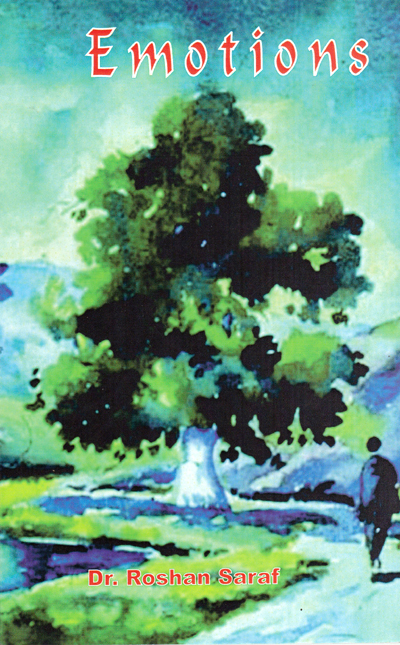Shiban Khaibri
An anthology of 53 short poems in English language under the title of “Emotions” by Dr. Roshan Saraf which was very recently released at a simple but impressive function held at Jammu Press Club is a blend of varied facets hovering round topics which are bound to appeal very intensely a human mind. Dr. Saraf is professionally a successful physician who treats diseases of the human body but takes on with his pen motivated by poetic aestheticism and flight of imaginations all that leads a human mind to ponder over nostalgic attachments , the birth place, the surroundings which mould one’s personality in the journey from the innocence of childhood to the age of adolescence and the growing youth that starts feeling jolted by turbulences of no ordinary nature due to forces unnatural , all manmade.
The book “Emotions” is a result of a motivation received by a poet who is nowhere seen equidistant from reason or logic while treating the issues perceived by him. The cause and the effect are treated by him with dexterity as in “Insidious insomnia” , he laments for ,” Restless nights of insomnia………….to misty moments of dementia”. Why so? A perception is built, a sensation is felt or an intuition is derived by the poet to express “emotions”. Do not intensely ask him why emotions are vented in a manner so varied , the expression regarding whom is a poet’s right if not a duty especially when dislodged from his nest of times immemorial.
This writer was simply amused with increasing curiosity to see a physician by profession not only having already emerged as a poet of reckoning in his own sweet mother tongue – Kashmiri, as also reciting them in “Tarannnum” or in the form of a song, being equally competent to do the same in English but playing musical instrument guitar like a maestro to sing one of the poems when “Emotions” was being released.
Dr. Roshan Saraf having made deep imprints in the literary landscape has lavishly expressed his emotions on topics which could definitely be of a mundane nature to those who cannot understand the ache, pain and the feelings of a poet who has for no fault of his lost the soothing shade of Chinar or the “Boonie” which he finds contrary to his expectations – “Why is Chinar shivering, the leaves charred ……………..poisoned to create ethnic worries”? A magnificent, graceful, calm, beautiful but strong tree called Chinar even shivers and its pristine green lofty leaves are charred, appears and rightly so, to the poet, “I looked around, there was nobody, but me and the Chinar in silence as if in some grief” vindicates the poet’s ache of having been driven out of his own niche in his beautiful garden. The scars of losing his motherland evoke his passions following “an echo of words” —“There is bloodshed around and the thunder of swords”. Contrast it with the poet’s lament, “I am born in Kashmir where seers and saints taught me to practice righteous deed…………”The poet is in possession of a legacy of the inherent “fragrance of my heritage, my composite ethos, my secular and cultural sustenance” and while ruing over its plummeting status, he has not lost the hope about its inherent strength and resilience which had its firm roots in what the mystics of high order like Lal Ded and Nund Reshi sermonized. The poet’s optimism about tomorrow bringing again to the fore, the lost characteristics of the heritage, the spiritual philosophy and inclusiveness emanate from which the real fragrance of what the birth place of the poet stood for. In “Shower of Passion”, the last poem in the book, Dr. Saraf weary of “sweats of separation” which he feels as hazy, confused and pungent, the rain God grants his prayer and blesses him with a cool and soothing shower which he feels replete with all the divine blessings to enable him “receive my beloved at the door to drench hungry emotions in the rain “.
Here he intensely feels getting a divine kiss which he feels both as “deep and dense” but he has also to share passions differently in “Naked flames of absolute truth, “Two sides of a coin” and “perhaps” among the other ones. A poet is rarely understood by all and sundry but when the spouse of the poet feels that “a man in charge of the house is supposed to do the domestics but not be writing lethargy” could be a pun and a satire on those who cannot appreciate emotions and an inspiration for the poet to sharpen his pen and keep musing to write more of the likes of the “Emotions”.


